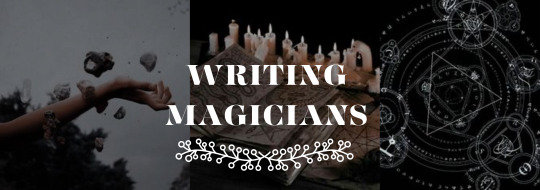Text
Some writers: *meticulously plan out every plot point and the tone and meanings before they start writing*
Me:

46K notes
·
View notes
Text
#sex photos#bungou stray dogs#emison#big bang theory#parks and recreation#perfect butt#sorry for being depressing#countryside#lee soo hyuk#rp#geto x reader#empires smp
122 notes
·
View notes
Text

Writing Magicians
If you are drafting or deepening a magician character, consider these personality traits and common characteristics of magicians. Your magician doesn't have to be set in stone or have all of these traits.
Intelligent
Magic requires a critical, quick, analytical mind to practice and implement. Must be capable of making difficult decisions.
Good Memory
For memorizing spells, potions ingredient lists, rituals and anatomy of magical creatures.
Creative
Magicians need to adapt existing spells and rituals to the situation
Self-disciplined and focused
Casting a spell or conducting a ritual requires the magicians to have unwavering focus and self-control.
Patient
Magic takes time to practice, especially if it's not a talent that you're born with. You also need patience to calm your human sacrifices down and make those stupider than you understand what's going on.
Highly trained
Mere talent is not enough. Practice - and pain - makes perfect.
Specialist
Magicians will have a spell/an element/a potion they are exceptionally good at
Musical
Many forms of magic involve drumming or chanting, or even singing.
Spiritual
Many forms of magic are linked with religious practices or concepts. Your magician might be heralded as a spiritual saint, or hunted for being a heathen.
Prayers are often a part of magic rituals.
Studious
Magicians are always keen to learn more, expanding their skills range, acquiring news spells, understanding different forms of magic and exploring scientific subjects.
Many magicians will amass books, or sign up for every available online class.
Well-orgnized and Methodical
The best magicians always have information and ingredients at hand and know where to find them.
They prepare thoroughly before rituals and have Plan B,C,D ready
Introvert
Many magicians like quietude and solitude in which they can recharge to practice a new spell in peace.
However, some magicians love social gatherings, maybe even showing off their power.
Ethical
Magic gives a person power, and requires moral judgements to apply this power wisely. You magician protagonist will be ethically challenged, but pull through difficult decisions guided by his good heart.
You magician villains, of course, will fall due to their unethical practice of power.
Sharp Sense
Your magician is likely to have a goos sense of smell/sight/sound, so that they can tell poisons part and catch the exact note of the chant.
Descended from Magicians
Magic is often portrayed as a talent that is passed down generations. It can be of blood (you must have "magical blood", so to speak), or it can be a guarded family secret.
On the flip side, your hero can be the only one with magical talent in a family with no such powers.
Psychic
Although magical and psychic gifts are separate matters, the power of foresight is often considered a branch of magic.
If your hero is a psychic, make sure it has limitations and consequences!
Day Job
Few magicians practice openly. Even if the magician earns money from her practice, she'd want to disguise her identity and pretend to work a more everyday job.
Many modern magicians work in the medical sector; other are employed in scientific, engineering or the arts field.
Pet
Magicians are known for thei close relationships with animals.
This can be a typical pet, or a mythical animal, or perhaps an incarnation of the devil, who knows?
If you like my blog, buy me a coffee☕ and find me on instagram! 📸
425 notes
·
View notes
Text
Body language cues for a few emotions
Happiness:
Smiling genuinely, with crinkles around the eyes.
Open body posture, with relaxed arms and shoulders.
Leaning forward slightly towards the person or object of interest.
Making eye contact with a warm and engaged expression.
Anger:
Tightened jaw and clenched fists.
Furrowed brows and narrowed eyes.
Standing or sitting with a rigid and tense posture.
Pointing fingers or aggressive gestures.
Raised voice or speaking through gritted teeth.
Sadness:
Downcast eyes and a drooping posture.
Slumped shoulders and shallow breathing.
Avoiding eye contact and withdrawing from social interaction.
Sighing or a subdued tone of voice.
Tearfulness, with watery or red eyes.
Fear:
Widened eyes with dilated pupils.
Raised eyebrows and a tense facial expression.
Frozen or rigid body posture.
Backing away or seeking physical distance from the perceived threat.
Trembling or shaking, especially in the hands or legs.
Surprise:
Raised eyebrows and widened eyes.
Mouth slightly agape or forming an "O" shape.
Leaning forward or recoiling backward in response to the surprise.
Quick inhalation or gasp of breath.
Rapid blinking or blinking more than usual.
Disgust:
Curling the upper lip or wrinkling the nose.
Narrowing the eyes and raising the upper eyelids.
Turning the head away or physically distancing oneself from the source of disgust.
Covering the mouth or nose with the hand or a tissue.
Expressing verbal disgust through phrases like "ew" or "yuck."
These are just some examples, and individuals may display variations in their body language based on their personality, cultural background, and the specific context of the situation.
12K notes
·
View notes


